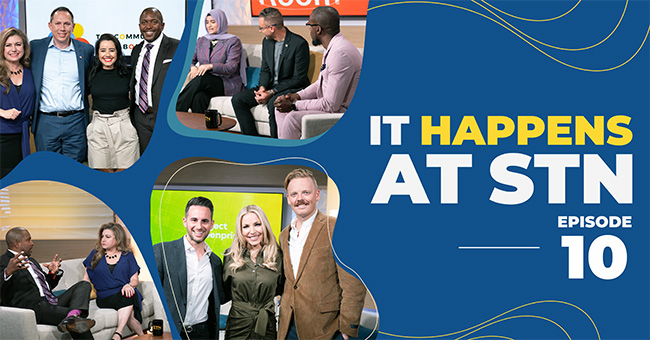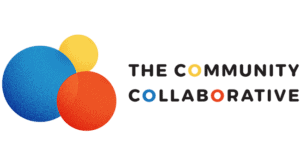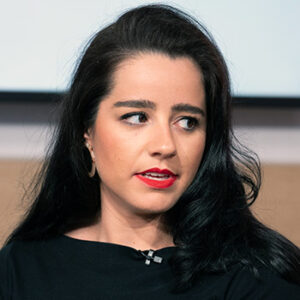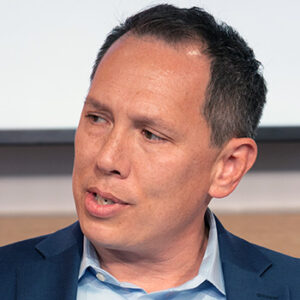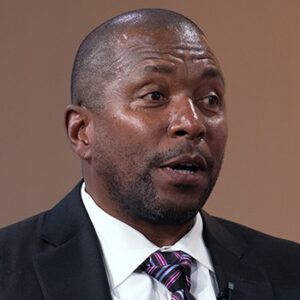What is professional social capital, how do you build it and why is it important?
For July’s Community Collaborative action panel, Hispanic Chamber of Arizona CEO Monica Villalobos and Arizona Black Chamber CEO Robin Reed are joined by University of Phoenix President Chris Lynne and Lucy Fernandez from Jobs for the Future.
The group talks about a brand new partnership and the Professional Social Capital Framework project.
Plus, they look at the role institutions of higher education and employers can play in building the social capital that can better prepare graduates, especially minority graduates, to enter the workforce.
Watch the Community Collaborative Action Panel
Community Collaborative is part of It Happens at STN, a local news hour dedicated to community growth and actionable solutions.
Each month, business leaders deliver best practices for diversity, equity and inclusion that are effective and applicable.
Action Panelists
Monica Villalobos
CEO – Arizona Hispanic Chamber
Lucy Fernandez
Solutions Design & Delivery Manager – Jobs for the Future
Lucy Fernandez
Solutions Design & Delivery Manager
Jobs for the Future
Chris Lynne
President – University of Phoenix
Robin Reed
CEO – Black Chamber of Arizona
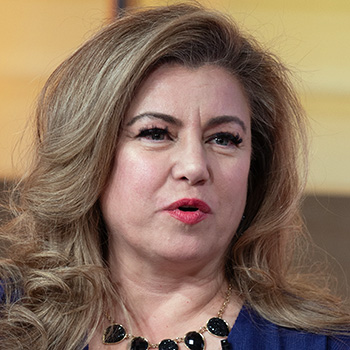
Network vs. Net worth
I think these folks have done an amazing job of building out a framework. Sometimes we think about networking, right? This is like networking [at a] different level. I often refer to this kind of thing as net worthing. Which is not what you think it might be. It’s not going out with someone and then determining their net worth that’s dating. But making sure that you’re always providing worth to others that you meet to make sure that you’re creating legacy as well.
Next Level
As we look at professionals in corporate America, one of the things that makes them so successful is who they surround themselves with and how they do that. So [there’s] almost this cocooning because you do a lot of nurturing in the cocoon and making sure that they have all the necessary elements to continue to build up.
So this is sort of next level, making sure that we’re building those safety nets within corporate America for communities of color.
Research Project
It’s so incredibly powerful because they (University of Phoenix) do have such a large alumni base. That is a great sample size to test this and to make sure that it’s working. I think this is exactly what’s needed to ignite and activate the power of minority communities and elevate it to the next level.
We’ve seen this a lot in non-minority communities; everybody lifting each other up and it’s shifting a mindset not only of employers but the employees to know that they need to look for this safety net. They need to create it for themselves. It’s been very exciting especially to see it in research by the numbers. That speaks volumes.
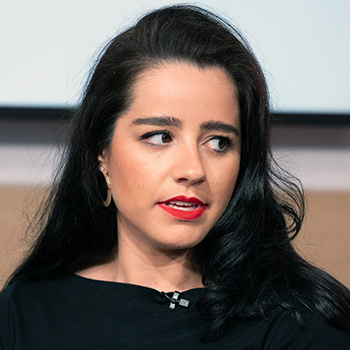
Laying the Foundation
When I started digging into the research, so many folks weren’t even sure how to define professional social capital. Often it was reduced to networking. Which [is] putting so much of the burden on the learners and workers themselves. It’s not enabling systemic change. So when we approached the Framework, we knew that we wanted to call upon an ecosystem of partners, especially post-secondary institutions, employers, and employers of all sizes to come together and think of this as a partnership. We wanted to provide very actionable, tangible steps that folks could start taking tomorrow.
Value of Sponsors
I really dug into the employer side of the Framework. The Harvard Business Review published this study that said only 5% of Black workers had sponsors and Black workers who did have a sponsor were 60% [more] likely to stay in the job, as opposed to those who did not.
There’s so much room for us to continue to do the work here, especially in terms of thinking about how we measure professional social capital. That’s something that we really wanted to offer some first steps to in the Framework as well.
All In
Employers [need] to think about building their own professional social capital. Who else in your community can you reach out to forge a partnership? How can you start preparing learners early on and bring them into the fold, making sure that they have the skills necessary to set them up for success, [and] the relationships necessary to set them up for success?
There are some low-lift options. How can you sponsor the current workers you have? How can you mentor the workers you have, especially for businesses right now coming out of COVID, retaining workers as a top priority, [and] recruiting workers as a top priority? How can you show your folks a little bit of love and make them feel valued in the organization?
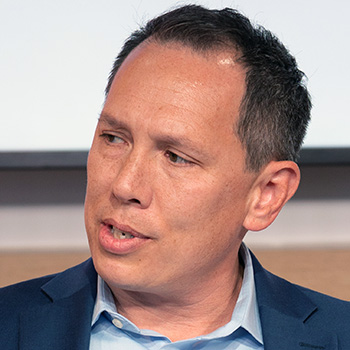
Campus Community
This is a really natural fit for the University of Phoenix. We’ve been around for almost five decades. We serve historically marginalized segments of society. Sixty percent of our students are first-generation college seekers. Almost 60% of them identify as minorities. A little over a third of our students are Black Americans. Two-thirds are women. Two-thirds have [a] dependent. And most of them are working when they’re pursuing their degree.
So at the University, we’ve had to learn to help them get through barriers their entire life. If you think of an adult learner, it’s a lot different than a traditional learner. They have busy lives, they have families, they have jobs. The students that we support have significant barriers that they deal with already. We have to fit education into that journey.
More than a Degree
We’ve become really good at providing the support systems and the advocacy networks that we know help those students be successful in attaining a degree. Over the last decade, we’ve been stepping back and saying, “Well, a degree is not enough.”
That’s sort of the common goal here. A lot of our students need more than that. A lot of the research is showing that in a professional environment, professional social capital, and everything that it brings, really opens doors. It helps students have those accelerants they need to be successful in their careers.
Advocates Needed
Something like 70% of jobs are not even posted. Up to 80% of them are filled by networking. One thing we learned in our career optimism index survey that we’ve been doing since 2021, is half of Americans don’t have an advocate in their professional life. That means they don’t have that network to tap into those jobs. They don’t have that network to help them accelerate in their jobs.
For our students, this is immensely important. As a career-focused university, we want our students to be successful in their careers. This [project] was a natural fit for our mission.
Light a Fire
I am excited about the fact that we built a framework. We do a lot of things at the university, both for our employees and our students. The Framework provides an opportunity for us to put what we do well into that framework so that we can put some formality around every aspect of the Framework, from helping our employees or our students learn how to understand their skills, [and] build on those assets to building networks and connections.
We have a million-plus alumni at the University of Phoenix and we can ignite that alumni network. They’re anxious to be ignited, and we’re already doing some of these things. So what we want to do is put initiatives in place that start to build this framework, but the Framework allows a foundation that can build year, after year, after year.
Measuring Success
One of our core strategies is to build career solutions for our students. One thing we did at the University is we aligned all of our curriculum to career-relevant skills. Skills that employers understand. We’re actually the only university that has done this to date. What that allows you to do is you can look at the profile as a student of the skills that you’re attaining, and you can map those skills into jobs in the marketplace.
We’re trying to build these solutions so our students can use them. We have career service advisors that will engage with them and help them learn how to build their resumes, [and] prepare for those discussions.
Our hypothesis is if they engage in this, they’re more likely to continue to progress in their degree. So we’ll look at retention improvements and completion, improvements as it relates to engagement in [what] this career supports. It really depends on the area that you’re focused on. Measuring is super important to make sure you’re making the impact.
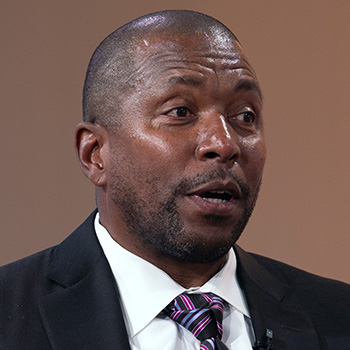
Who and What
We’ve all heard the adage, “It’s not what you know, it’s who you know.” But, imagine the power of what you know and who you know, coming together. I think combining a University of Phoenix degree with the incredible data that’s come out of JFF (Jobs for the Future) shows you what happens when you put what you know with who you know and the value it brings to all marginalized communities.
Moving Forward
How do we train our young people on how to seek out a sponsor? Let’s make a dual purpose, not just a singular purpose. One of the challenges we see is companies often hire a director of DEI, and it’s a staff of one with no measurable metrics and no budget. So they parade the person around. They check a box.
But maybe the data that this is starting to show will show the importance to companies of why that diversity, equity, inclusion, [and] belonging is as important as the financials, as operations, as HR, in any company.


